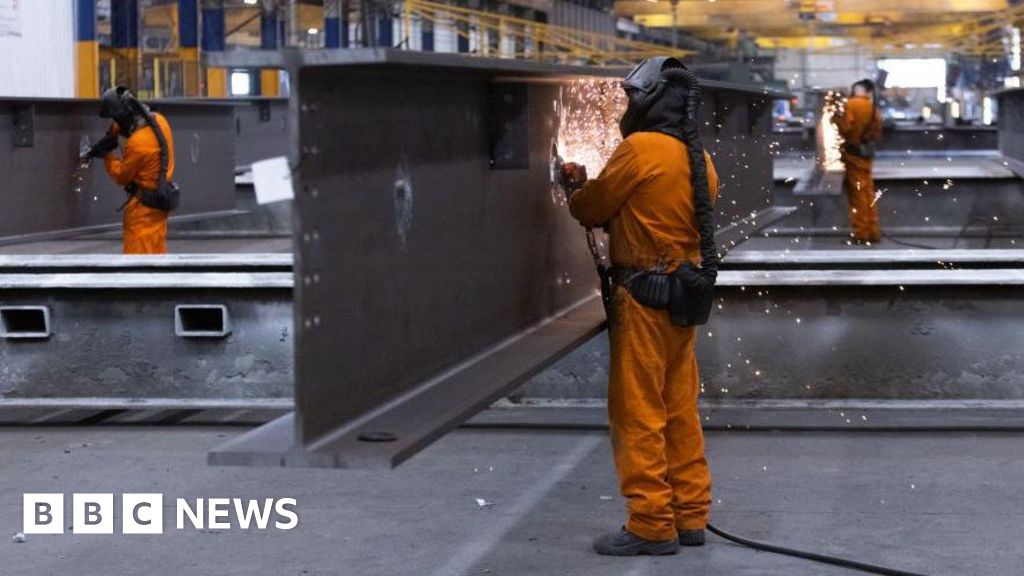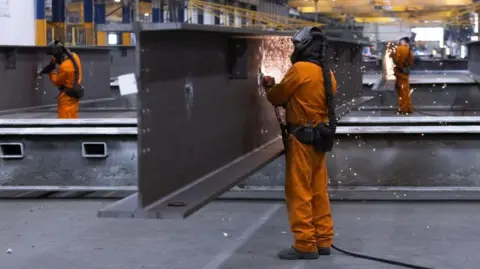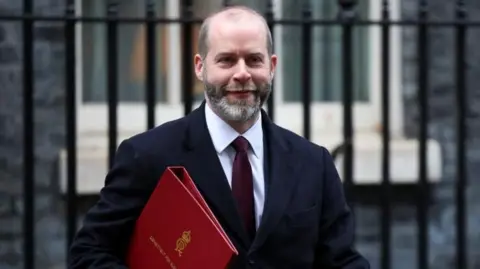Government plans to protect UK steel industry amid threat of tariffs

 Getty Images
Getty ImagesThe government has announced plans to protect the UK’s steel industry in a bid to secure its long-term future, as it faces the impact of potential tariffs.
The Plan for Steel will include measures that seek to bring down the cost of production and encourage the use of domestic steel in infrastructure projects.
It also hopes to protect UK steel from “unfair trading practices abroad”, including being undercut by cheaper suppliers.
The announcement comes days after US President Donald Trump said he would impose a 25% tariff on all steel imports from 12 March – something the UK sector fears would cost it millions in trade.
Business Secretary Jonathan Reynolds launched a consultation on the government’s Plan for Steel to look at long-term issues facing the industry, after ministers committed to providing up to £2.5bn in support.
While the consultation does not directly address the threat tariffs may pose to the sector, Reynolds said the financial support for the steel industry was “to protect our industrial heartlands, maintain jobs, and drive growth”.
Shadow business secretary Andrew Griffith said the “uncertainty” the steel industry faced due to US tariffs was something the government “has been entirely silent on when instead they should be talking to the US, our closest trading partner”.
The Plan for Steel will address issues that have been “holding the industry back for too long”, the Department for Business and Trade (DBT) said.
These include:
- Identifying opportunities to expand steel production
- Encouraging the use of UK-made steel in public infrastructure projects, such as the proposed Heathrow Airport expansion
- Improving scrap processing facilities
- Investing in electric arc furnaces, which are less energy-intensive than blast furnaces and use less carbon-emitting coke
The consultation will also examine electricity costs for steel companies “to make the UK competitive globally”, and how to protect the sector from unfair trading practices abroad, such as cheap imports flooding the market, the DBT added.
The announcement does not directly address the potential impact of Trump’s tariff plans at this stage, nor does it include a firm commitment to reduce energy bills.
The government has previously said it would not retaliate immediately to the tariffs announced by Trump, despite many in the steel industry calling on Britain to join the EU and Canada in threatening reciprocal measures.
Reynolds told the BBC earlier this week the UK had a strong case to avoid the import taxes – which Trump has said will be enforced “without exceptions or exemptions” – as British exports to the US were small in comparison to other nations and steel was used in areas such as defence.
UK Steel, which represents the industry, has said the tariffs would be a “devastating blow” that would damage the sector’s £400m-a-year contribution to UK-US trade.
The UK is not a big supplier of steel to the US, with the country accounting for about 10% of British steel exports.
But there are concerns within the industry the tariffs might not just hinder exports to the US, but also lead to excess steel being “dumped” in the UK.
This could occur if other countries no longer exporting to the US decide to offload steel at cheaper prices, which could potentially lead to UK steelmaking businesses being undercut.
The government hopes its plan will secure jobs in the UK’s steel industry and secure its future.
Financial support could benefit Scotland and areas such as Scunthorpe, Lincolnshire, Rotherham in South Yorkshire and Redcar in North Yorkshire “which have a strong history of steel production”, the DBT said.
 Reuters
ReutersHelp will be available through the National Wealth Fund, which partners the government with the private sector and local authorities to finance infrastructure and other projects.
The DBT said it was “wasting no time” supporting UK steel, pointing to the government’s backing of expanding Heathrow Airport, which it said would require 400,000 tonnes of steel.
The UK steel industry has faced heavy job losses in recent years.
Tata Steel said it was replacing traditional blast furnaces with an electric arc furnace at its largest UK site in Port Talbot, Wales. Traditional steelmaking at the site ceased in September, resulting in 2,800 job cuts.
British Steel announced in 2023 it would close blast furnaces in Scunthorpe, and unveiled plans to roll out an electric arc furnace, which requires fewer workers to keep it going, with 3,000 jobs expected to be axed.
The GMB union said the government’s plan to support the “beleaguered” steel industry provided “desperately needed” funding after “years of dithering”.
“As the world becomes more volatile, primary domestic steel making capacity is vital for both our economy and domestic security,” the union’s national secretary Andy Prendergast added.
Gareth Stace, director-general of UK Steel, said the government’s commitment to the industry was “both vital and welcome”.
Information gathered in the consultation will be used to help form a “steel strategy”, to be launched in the spring.
Stace added a robust strategy “has the power to reverse the sector’s decline, particularly as we face increasing competition from imports benefiting from more favourable business conditions”.
Griffiths said he looked forward to seeing a detailed plan, but added “a clear part must be steps to reduce the cost of energy which is placing an intolerable strain on UK steel”.
Related
Why investing in women is a vital next step for…
Get Nadine White's Race Report newsletter for a fresh perspective on the week's newsGet our free newsletter from The Independent's Race CorrespondentGet our fre
Business secretary signals major shift on electric car policy to…
In a determined effort to retain Nissan’s manufacturing presence in Britain, Business Secretary Jonathan Reynolds has vowed to implement “substantial c
Joint Statement: Business Secretary and Fujitsu Services Ltd
Business and Trade Secretary Jonathan Reynolds today (Friday 7 March) met chiefs for Fujitsu in Tokyo to begin talks over the cost of redress for victims of th
UK foreign secretary backs multilateral defence funding for Europe
UK foreign secretary David Lammy has said that a new multilateral fund will be needed to secure Europe’s defence as he confirmed that Britain is “open to”














